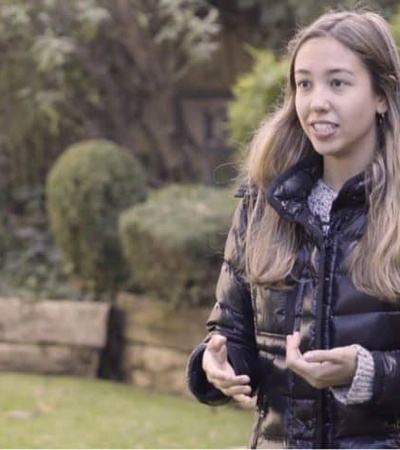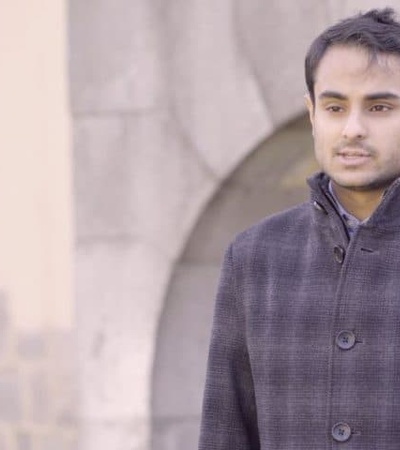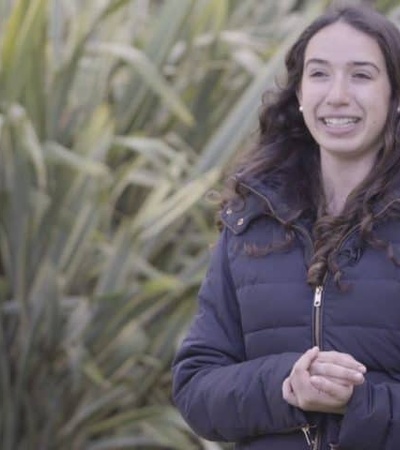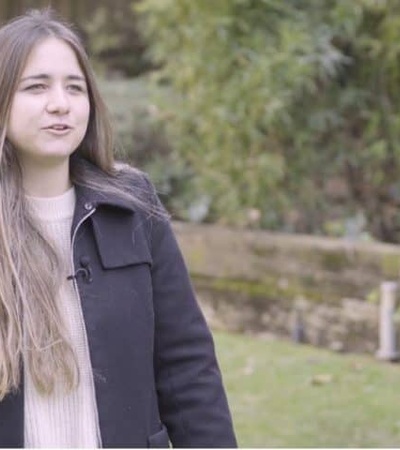
IEU Students going abroad
- Home
- International Experience
- International Experience
- Ieu Students Going Abroad
WHAT DO I NEED TO KNOW?
The international exchange option that is a part of IEU undergraduate programs can enhance our students’ academic, personal and professional development. With an option to choose from a wide variety of prestigious international universities, the semester abroad is an enriching and life-changing experience.
Before applying:

Before applying to our IM Calls...
Before applying to our IM Calls, please check your study plan with your school’s office to confirm when you are eligible to go abroad.
Alongside the publication of our IM Calls, we also provide a list of our bachelor’s eligibility criteria for each semester.
Even so, we highly advise our students to plan ahead and seek out information before the Call is announced.

Have a look at our interactive...
Have a look at our interactive map that shows the locations of our partner universities!
Before making your selection, research the universities you are interested in.

When you go on exchange...
When you go on exchange, you will only pay tuition at IE University and not the partner institution.
Other expenses such as airfare, accommodation, food, medical insurance, passport/visas and personal spending should be taken into consideration before committing to a program.
(Check our partners fact sheet on campus for an estimated cost of living).
WHEN CAN I GO ON EXCHANGE?
Click here and find out in which semester you can go on exchange depending on your bachelor and start planning your transformative international experience!
IE UNIVERSITY PARTNERS
IEU has agreements with over 200 prestigious universities in 50 countries worldwide. This allows our students to spend a semester abroad, enriching their studies while also giving them the option to travel and broaden their perspectives

MY STEP-BY-STEP EXCHANGE PREPARATION
Gather information!
Students interested in completing a semester abroad are invited to attend the annual International Mobility Week, which occurs in November. This provides students with the opportunity to:
- Attend info sessions about the mobility process and ask relevant questions.
- Meet exchange students from partner universities during the International Mobility Fair.
- Attend online presentations from several partner universities, scheduled throughout the week.
It is important that students research their options and preferred universities, and understand the commitments of doing an exchange semester.
We also advise that you approach your Bachelor’s Office for first-hand information about the academic requirements you will need to cover in your exchange, such as the number of credits, course equivalence, etc.
The application period opens!
Students have a month to apply for an exchange to their preferred university. You can apply for certain semesters only, depending on your program. It is also recommended that students seek academic assistance from their Bachelor’s Office to get advice and understand the academic requirements they must comply with while on exchange.
Submit your exchange preferences!
Students choose their university options for the exchange by order of preference. All applications are equally considered as long as they are submitted within the communicated deadline. Students who submit an application will be ranked according to their average GPA.
Accept your exchange spot!
Results are published! In this step, students are assigned one of their choice institutions and asked to confirm their acceptance online. This student confirmation is essential for those who wish to participate, giving the International Mobility Office an opportunity to start preparing for your semester abroad.
Your exchange is underway!
Students who have accepted the exchange spot are nominated. This means the International Mobility Office sends your details to your future Host University so they can start preparing for your semester abroad. The Host University then sends application instructions to nominated students.
Send your application!
Students complete and submit their applications to the Host University. IE University exchange students do not pay tuition fees to the Host University (only to IE University). However other fees may apply, such as insurance, administrative fees, extracurricular activities, etc. It is the student’s responsibility to cover accommodation and these additional fees.
You’re good to go!
Students are admitted by the Host University and receive further academic and practical information. After this, you can start preparing for your semester abroad: housing, transportation, student visa (if applicable), etc.
INTERNATIONAL MOBILITY CALLS
Common steps for all students
November
International Mobility Week happens! Make sure to attend the Fair and informative sessions.
December
International Mobility Call opens. Students can submit their applications between December and January.
January to february
Results are posted. Make sure to accept your offered slot!
Next steps for students going on exchange in the Fall semester
February
Informative sessions where we cover the subsequent stages of your exchange semester.
February to
June
Application and admission processes to the Host University take place.
August to
September
Arrival at the Host university and start of classes! Make sure to attend any welcome events and activities offered by the Host University as these will be very useful towards your acclimation.
December
Time to leave and return to IE University! Remember, we will need to receive a copy of your Official Transcript of Records so you can obtain the corresponding credits at IE University.

Next steps for students going on exchange in the Spring semester
September
Informative sessions where we cover the subsequent stages of your exchange semester.
September to
November
Application and admission processes to the Host University take place.
January To
february
Arrival at the Host university and start of classes! Make sure to attend any welcome events and activities offered by the Host University as these will be very useful towards your acclimation.
May to june
Time to leave and return to IE University! Remember, we will need to receive a copy of your Official Transcript of Records, so you can obtain the corresponding credits at IE University.

GRANT OPTIONS FOR STUDENT MOBILITY
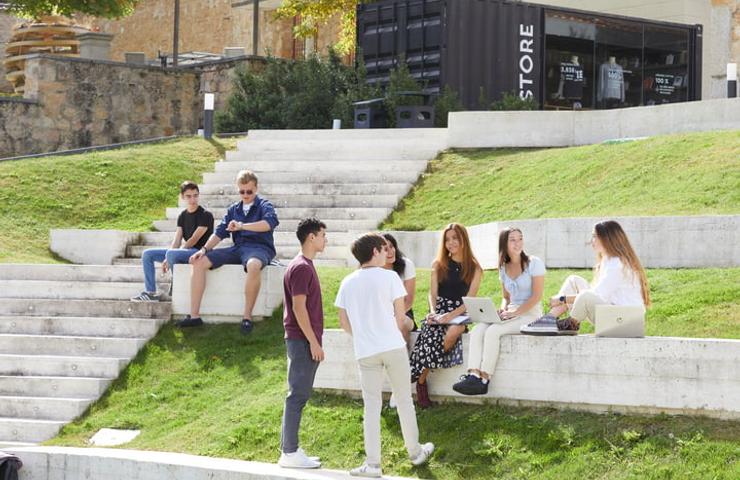
ERASMUS PROGRAM
ERASMUS PROGRAM
- The mobility, either for studies or internship, must take place in one of the program countries indicated in the Erasmus Plus Program Guide. Students from any nationality are eligible to apply for an exchange to study in a European University under an Erasmus agreement.
- In the case of Erasmus Student Mobility for Studies (SMS), each mobility must have a minimum duration of three months (90 days). For the Erasmus Student Mobility for Placements (SMP), each internship must have a minimum duration of two months (60 days).
- The maximum number of months you can request for an Erasmus scholarship is 12 months, including both internships and academic exchanges. For example, if you receive a scholarship for a six-month academic exchange, you can only request an internship scholarship for a maximum of six months.
- Only internships with a monthly gross remuneration lower than €1000 will be eligible for the Erasmus scholarships, regardless of the country where the internship takes place.
- Students must have a valid DNI or NIE to participate in the Erasmus Program, both for studies and internships.
- Students need to hold a European bank account in their name.

SANTANDER ERASMUS GRANT
SANTANDER ERASMUS GRANT
Banco Santander currently offers a scholarship for students who take part in an exchange abroad.
The Santander Erasmus Scholarship program’s purpose is to recognize the academic excellence of Erasmus students and promote educational inclusion and equal access to opportunities. The scholarship is aimed at students enrolled in a Spanish university, going on an exchange to a university within the Erasmus+ programs for the mobility of studies and/or internships in Europe. Make sure you meet the requirements and deadlines established.
NB: The IE International Mobility Office does not manage this grant. It is up to students to apply if interested.

JUNTA CASTILLA Y LEÓN GRANT
JUNTA CASTILLA Y LEÓN GRANT
Every year, La Junta de Castilla y León (the Board of Castille and Leon) offers additional economic assistance to students who are recipients of the Erasmus grant. This is optional and students who are interested are advised to search the JCYL website for the specifics of this grant.
NB: The IE International Mobility Office does not manage this grant. It is up to students to apply if interested.e requirements and deadlines established.
MEET OUR STUDENTS
Discover the experiences of our students going abroad.
Anselme Charleslouis Ticquet
"Having to adapt to another culture prepares you for a global workplace and definitely adds value to your professional profile. Personally, it gave me the opportunity to reflect on my ambitions and to think about my aspirations from a different paradigm."
Hitotsubashi UniversityJustin Morgan
"I chose to go on exchange because if I’m ever given the chance to discover somewhere completely different, I will take it 100% of the time."
University of St. GallenMiguel Serrano
"I think it’s important to be exposed to various global perspectives in order to understand the big picture. That’s one of the main reasons why I wanted to take part in IE University’s Undergraduate Exchange Student Program."
University of MichiganEva Monzón
"IE University gave me the opportunity to experience living and studying abroad, which was an important element for me."
Università degli studi di MilanoClémentine Gautier
"I have a passion for discovering new locations, so I eagerly seized the opportunity to spend a semester abroad at Rio de Janeiro. Throughout my stay, I immersed myself in all that Rio had to offer, both within the university and in the broader region."
FGV Direito Rio University
LEARN ABOUT EXCHANGE EXPERIENCES
GABRIELA CHIA
Gabriela from Spain, went on exchange to Nanyang Technological University in Singapore.
KARAN KHOSLA
Karan from India, went on exchange to the University of Michigan in the United States.
NOA BENZADON
Noa from Colombia, went on exchange to Hong Kong University.
RITA FERNANDEZ
Rita from Spain, went on exchange to Science Po in France.
SOFÍA GAVIRIA
Sofía from Colombia, went on exchange to Korea University in South Korea.
FREQUENTLY ASKED QUESTIONS
When can I go on exchange?
This depends on your program and year of study.
Can I go on exchange to any IEU partner university?
No. This depends on your area of study and the semester you can go on exchange. We have agreements with many universities worldwide;however,not all of them offer courses in your area of study. Students must check this before applying for an exchange spot.
Will I pay tuition fees at my Host University?
IE University exchange students do not pay tuition fees tothe Host University (only to IE University). However, other fees may apply, such as insurance, administrative fees, extracurricular activities, etc. It is the student’s responsibility to cover accommodation and these additional fees. This must also be taken into account before applying for an exchange.
Will the credits I earn abroad be recognized by IE University?
Yes. When students do an exchange to one of our partner universities, the credits they earn abroad are added to their final transcript from IE University. Students must make sure their exchange transcript is sent to IEUniversity after their exchange period is over.
What documents do I need for my exchange?
Doing an exchange requires having certain documentation in order and completing a series of steps before beginning yourstay abroad. Allow sufficient time to prepare or renew the following documentation if necessary before your exchange semester:
- DNI/NIE – Students must hold an Identity Card (DNI) or valid Foreigner Identity Number (NIE)throughout their stay abroad. If you are not a Spanish citizen, make sure you hold a valid NIE before the beginning of the exchange to be able to return to Spain as a student once your semester abroad is over. Keep in mind that renewing a NIE is a slow process, so it is advisable to start the application or renewal process as soon as possible. You can contact the Student Services team should you have any questions.
- Passport – Students must hold an up-to-date passport, valid for more than six months after the end of the exchange semester. This applies especially to non-EU citizens and/or students going on exchange to a non-EU country. This document is necessary to be able to apply for a student visa should you require one. The Host University usually asks for a passport copy as part of the application process, so we advise you to keep photocopies of your passport and make sure it is not expired.
- Dual nationality – In case they hold two or several nationalities, students must research well in advance if there are restrictions imposed by the country of destination. This should be checked on the corresponding Embassy website.
Do I need a visa for my exchange?
For some countries, obtaining a visa will be mandatory. Immigration laws change continuously. It is therefore necessary to gather information on the Embassy website of the country of destination. If applicable, Host Universities will provide documentation to enablestudents to apply for a visa.
However, students should make sure they fully understand the requirements and procedures, depending on their nationality and theregulations of the country of destination. Some countries don’t allow students to apply for a visa up to three months before the start of theexchange semester.
- Citizens of the European Union: Students don’t need to apply for a visa for destinations within the European Union. For destinations outside the European Union, it is recommended to check with the corresponding Embassy.
- Citizens from outside the European Union: Students must research the processes to follow,depending on their nationality and the country of destination.
If a visa is required to access the country of destination, some of the following documents may be requested:
- Passport: It is essential that the passport be valid for more than six months after the end of the exchange semester.
- Admission letter: This will be issued by the Host University after their application process is completed.
NB: The IE International Mobility Office does notmanage visa applications for students.
What other documents can be required for my exchange?
Language Proficiency Certificate: Some Host Universities ask non-native exchange students to be proficient in their language of instruction and require a language certificate to that effect. This can be in English, or in Spanish or Portuguese if the country of destination is located in Latin America. This can apply to other languages as well, should students be interested in taking classes conducted in another language while abroad.
Since classes at IE University are fully taught in English, some Host Universities can accept a letter of proficiency from the International Mobility Office. However, some do require an official language test, such as TOEFL, IELTS, etc., which students should be able to provideas part of their application to the Host University.
Bank Statement: Certain countries, especially the US, Canada and Australia, request a bank statement to be able to issue astudent visa. This document is drawn by the student’s bank (or that of their parents/tutor) and should state that the student holds sufficient funds to cover their stay.
The specific amount required is usually specified by the Host University. The bank statement must be requested in the language of the country of destination and the local currency.
Health Insurance: Before beginning their exchange semester, students must make sure they hold insurance with adequate medical coverage abroad.
Students going to a European country can request the European Health Insurance Card and/or take private insurance. Some countries also request a Medical Certificate to be able to apply for a visa and/or the purchase of private health insurance that covers students’ stay abroad. This can be a mandatory package selected by the Host University, which students must sign up for.
Vaccination and health recommendations: Vaccinations to travel within the European Union are usually not necessary. However,students should still check the requirements of each country. Outside the European Union, some countries require students to have a series of up-to-date vaccinations.
The list of vaccines demanded isusually sent by the Host University. However, it is advisable to anticipate this and request a medical appointment as part of the exchange preparations.
What about housing?
It is recommended that students research existing accommodation options. Availability, quality and rent can vary considerably from one city/country to another. This expense should be kept in mind when applying for an exchange.
Most Host Universities share housing options on their website or send them directly to students. It is advisable to follow their recommendation. Some of them can offer on-campus housing to exchange students; however, this is never guaranteed and is subject to availability.
NB: The IE International Mobility Office does notmanage housing for students.
When can I start booking flights and housing?
We usually recommend students wait to receive their official letter of admission from the Host University and, if applicable, their student visa, before incurring any type of expense. Should students still want to anticipate this, we recommend they sign up for a cancellation policy along with their booking.









